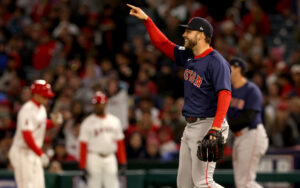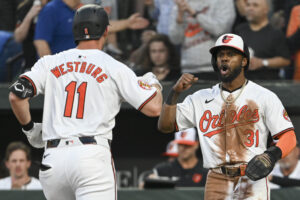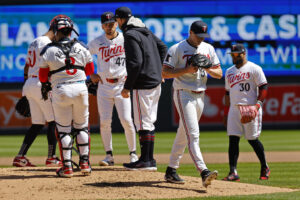The 1900s in baseball were marked by two things: a significant lack of offense and a brand new major league. The Dead Ball Era was in full swing and impacted power numbers severely. Players were considered terrific if they hit five or six homers a year. So, teams came up with a plan to combat this: hit for contact. Ty Cobb, Nap Lajoie, and Honus Wagner were among the Hall of Famers to take advantage of the strategy. Meanwhile, the American League sprang up and began to raid National League rosters. The rivalry was so heated that the two leagues would refuse to play a World Series until 1903.
Yet, even in all this excitement, misery reigned in Boston. Throughout the decade, the team showed a serious decline. Even with future Hall of Famers Kid Nichols and Vic Willis in tow, Boston never finished above third. This would lead to a name change, multiple managerial changes, and many years in the cellar. However, 1914 would be just around the corner.
Selee Bids Adieu to the Beaneaters
Frank Selee’s final years as the Beaneaters manager were wracked with trouble. 1900 would see the beginning of the end. The team finished fourth, compiling a 66-72 record. However, one member would have a shining moment. July 7 saw Nichols pitch to his 300th career win, defeating the Chicago Colts 11-4. Unfortunately, he finished with a 13-16 mark for the season. The rest of the team was just as middling, finishing with mediocre numbers in both offense and pitching. While they did pace the league in homers (48), their .283 team average was only good for fourth. Their team ERA (3.72) was third.
The team saw marked improvement over the next two seasons. In 1901, they finished 69-69. While this was only good for fifth, the pitching staff dropped its ERA (2.90). Nichols was back to form, finishing 19-16 with a 3.22 ERA and a 112 ERA+. Fellow hurler Willis posted his first 20 win season in two years. He compiled a 2.36 ERA and a 123 ERA+. Unfortunately, the offense was dreadful. Their .249 average was last in the league. They also finished last in runs (533), hits (1,180), doubles (135), triples (36), and total bases (1,471). Their combined OPS+ was an abysmal 69.
Buckenberger’s Blunders
This led the Beaneaters to look elsewhere for leadership. They hired Al Buckenberger to manage. He had managed the Pittsburgh Pirates in the early 1890s. However, he had not helmed a team since 1895. His first year with Boston saw a leap to 73-64 and a third-place finish. While the offense did not make any major improvements, the pitching flourished. With the departure of Nichols, Willis was the ace of the club. He made it count, going 27-20 with a 2.20 ERA and a 128 ERA+.
Unfortunately, the Buckenberger “era” led to two more years of misery. The Beaneaters fell to 58-80 in 1903, and 55-98 in ’04. The offense was all but shut down. They hit .245 in 1903 with a combined OPS+ of 82. 1904 saw similar production, with a .237 average and an OPS+ of 85. But, there was one bright spot — first baseman Fred Tenney. He hit .279 between the two seasons, with 302 hits, 35 doubles, 12 triples, 160 runs scored, and 34 stolen bases in 296 games. However, his defense left a lot to be desired. He committed 55 errors in the two campaigns, posting a -0.3 dWAR for each.
The pitching suffered even more. Staff ERAs of 3.34 in ’03 and 3.43 in ’04 placed them towards the bottom of the league. While Willis still pitched to an excellent 2.98 ERA in 1903, he only posted 12 wins. The rest of the staff did not fare any better. Nobody finished above .500. Right-hander Togie Pittinger posted the best record (18-22). The next season saw the team repeat this feat. Willis led the team with 18 wins but lost 25. Pittinger went 15-21. However, both pitched to ERAs in the mid-twos.
1905 & ’06: Dreadful Times for the Boston Beaneaters
Thus, it was time for another change in Boston. Tenney himself was called upon to manage in 1905. But, the team got worse, posting an abysmal 51-103 record. The bats were quiet, finishing last in average (.234), runs scored (468), hits (1,217), OBP (.284), slugging (.293), and OPS (.576). Their combined OPS+ was a miserable 74. The pitching wasn’t any better, finishing last in most of the league’s categories. Once again, nobody finished over .500, but the worst was Kaiser Wilhelm, who went 3-23. In short, 1905 was one of the worst seasons in Braves franchise history.
But 1906 made ’05 seem heavenly by comparison. Tenney continued to lead, and the Beaneaters continued to suffer, dropping to 49-102. The offense was abhorrent, finishing with a .226 average and a combined 2.6 WAR. Though, ironically, their OPS+ actually jumped to 80. Meanwhile, the pitching saw the departure of Vic Willis. For the first time since 1890, the Beaneaters did not have a future Hall of Famer on their staff. Irv Young, Vive Lindaman, Big Jeff Pfeffer, and Gus Dorner combined for a .325 winning percentage. The team ERA of 3.14 planted them last in the league. To sum it up, the team finished 66.5 games out of first place.
A Soft Name for a Soft Team
The next season saw a change in the team’s name, from the Beaneaters to the Doves. The 1907 season saw marginal improvement under Tenney’s leadership. The unit managed to hit .243, and their OPS+ jumped to 94. However, their record was 58-90, and the pitching was still terrible. So, Tenney’s time as manager came to an end. He was replaced by Joe Kelley, who led the team through 1908. Under his guidance, the Doves posted a 63-91 mark. The offense was mediocre, finishing with a .239 average and a 93 OPS+. However, they did place fourth in runs scored (537), and hits (1,228). The pitching was fairly solid by today’s standards, and two players finished over .500. However, this was the Dead Ball Era. The team’s ERA of 2.79 was last in the league.
Finally, 1909 rolled around, and it might have been the worst of all. Kelley was out as manager, replaced by Frank Bowerman. When he posted a 22-54 mark to start the season, he was taken down. Harry Smith would guide the team to a 23-54 record the rest of the way. The offense was woeful, hitting .223 and posting a 71 OPS+. They finished last in doubles (125) and triples (43). Outfielders Roy Thomas and Ginger Beaumont led the team with .263 averages. The pitching scuffled, posting a 3.20 ERA, an 88 ERA+, and striking out a mere 414 batters in 1,370.2 innings of work. All of this led to a 45-108 mark, 65.5 games behind the pennant-winning Pirates.
Main Photo:
Embed from Getty Images






